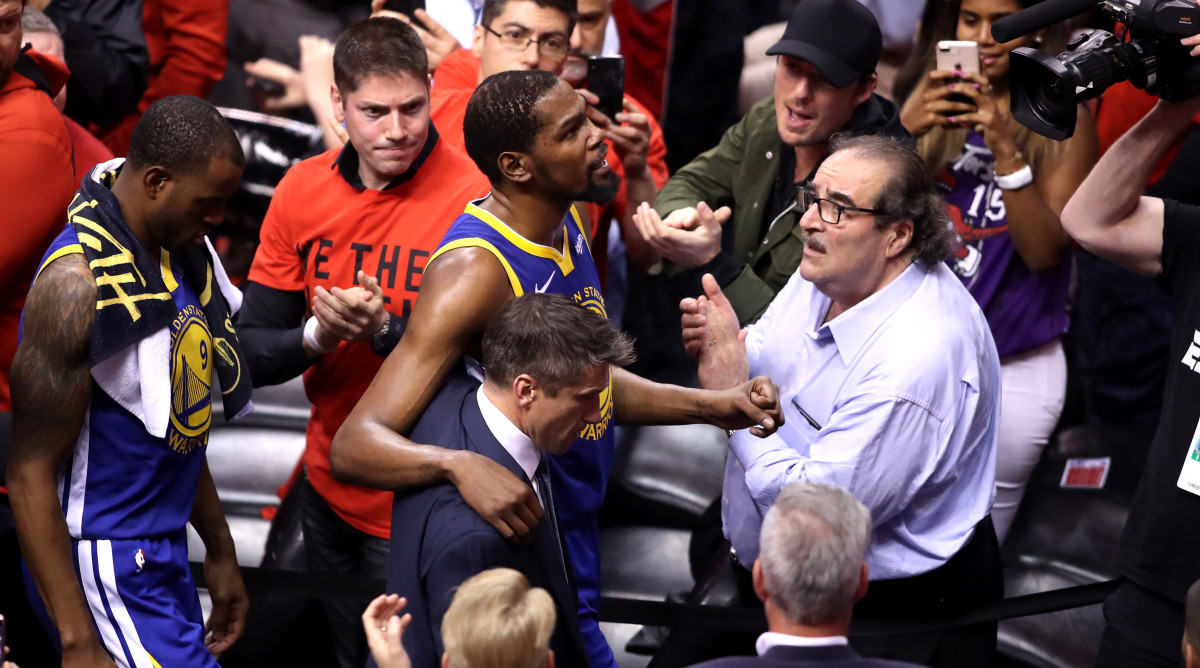The Entire NBA Changed When Kevin Durant Suffered an Achilles Injury

There are some events in the NBA so consequential as to shift the ground beneath the entire league. Kevin Durant’s injury, presumed by the Warriors to be a torn Achilles tendon, is one such trigger—not only for its tidal force in the championship series, but all that comes after on a much broader scale. At the epicenter is a person. It took Durant a month of rehabilitation from a strained calf to return to the court for the Warriors, and seemingly should have taken more. The motivations for his playing are obvious, the reasons for his allowance less so. Surely this is only the beginning of their interrogation. There is a long, painful road ahead for Durant, one with ample opportunity to scrutinize how he ended up on the floor at all.
Considering the particulars involved, this is as serious as basketball injuries get. The Achilles is a finicky piece of tissue with the power to twist a career; sports medicine has come quite a long way, but even a best-case scenario from a torn Achilles would likely involve Durant missing one of the prime years of his career before even learning to move again. That the tendon in question happens to belong to the best player in the sport only adds to its complication. LeBron James spoiled an entire generation of NBA fans by averting major injury while with the Heat and Cavs. If Durant’s injury is as feared, he could be in line for the second lost season of his career to date, after a series of foot surgeries sidelined him for the majority of the 2014-15 campaign.

This too shall pass, though not without cost. Consider Durant’s teammate, DeMarcus Cousins, as a test case. Cousins ruptured his left Achilles in January of 2018 and did not play in an NBA game for just short of a full calendar year. Upon his return, Cousins played limited minutes with periodic nights off, logging time in 30 regular season games. He never quite looked himself. Within three months, Cousins tore his left quad while in pursuit of a loose ball. It was a related injury in the sense that most tend to be where mechanics are involved. A foot injury can cause long-term back pain. A hip flexor issue can lead to overcompensation elsewhere. It’s impossible to ignore Cousins’ Achilles—and all that his body had done to offset its burdens—when considering his latest injury and current state.
Cousins is now 17 months removed from his Achilles injury and still out of sorts: stymied when moving laterally and unable to get much lift at all. Perhaps Durant will have a smoother recovery. Perhaps not. It’s the fact that his future is up in the air that makes this injury so painful and so consequential. It should go without saying that Durant’s upcoming free agency has been reframed overnight, in part because Durant’s priorities may have changed with his circumstances. In the wake of this sort of injury, might a player like KD gravitate toward the familiar instead of blazing some new trail with a different set of teammates? It’s also entirely possible that Durant could hold the Warriors and their training staff in some way responsible, in which case he’d be all the more likely to skip town.
Whatever his leanings, they could influence the free agency of players like Kyrie Irving (long rumored to be teaming up with Durant this summer) or Jimmy Butler (who could be the next wing in line for teams now wary of Durant’s injury or unable to sign him). Those preferences could play a part in where Anthony Davis ends up, as his interest in contending for the playoffs no longer aligns with Durant’s immediate timetable. There is a void at the top of the league and at the top of this free agent class. Both will be filled, perhaps in ways we don’t yet expect.
It’s all we can do to watch this particular development ripple its way through the league—first through a Finals series that Durant might have turned. It’s not a stretch to say that without Durant scoring 11 points in 12 minutes before exiting the series for good, the Raptors might already be champions. It took everything the Warriors had from that point to eke out a 106-105 victory. Even a couple of forced attempts or a few minutes of additional strain could have weighed down Golden State just enough to lose. It’s because Durant played that the Warriors now have a chance, even if it came at too great a price. Should they actually win, there could be another wave of implications—beginning with what that could mean for Kawhi Leonard’s own free agency and extending deep into the legacies of Stephen Curry, Klay Thompson, and Draymond Green.
There is an opportunity cost for Durant in being out of superstar-level operation for so long, when he might otherwise be competing for titles and claiming awards. It is always difficult to account for absence in memory, much less to quantify it when some basketball scholar 50 years in the future tries to compare Durant’s accomplishments across eras. What chance KD had of finishing his career as one of the two or three most prolific scorers in NBA history now feels remote. Even the top five—and a place alongside Michael Jordan—will take some doing. That hardly seems to matter now, but it might, someday, to Durant.
We have no earthly way of knowing what kind of player Durant will be on the other side of a year-long rehabilitation, what penalties an injury like this might take. Most ominous is the uncertainty of it. A career, a dynasty, a Finals series, and an entire league changed on Monday night in ways we can’t yet comprehend. Slowly learning how will be a reckoning with all that Durant lost.
